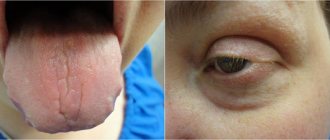Consequences of a cold during pregnancy
Doctors strongly recommend not to get sick in the first three months of pregnancy. This is a huge risk for the baby, because various inflammatory processes in the body can lead to complications during childbirth, early loss of amniotic fluid and bleeding, and it is possible that the child may develop many pathologies. Up to the 16th week, colds can affect the baby’s central nervous system. In later stages, a cold is also undesirable, but with proper treatment it does not pose much of a danger.
It is necessary to treat colds during pregnancy, even though the means for this are in an “interesting situation” and significantly limited. After all, a “sore” is dangerous precisely because of its consequences, which can manifest themselves in the absence of a proper response. If the child’s relatively mild colds are “spared” with a high degree of probability (although not a single specialist can say for sure whether a cold will affect the child), then severe viral infections, especially in the early stages of pregnancy, can cause developmental disorders of those organ that are formed during the period of illness. What can be relatively “calming” is the fact that a cold suffered during pregnancy does not cause genetic abnormalities and pathologies.
How does a cold affect pregnancy?
Does a cold affect the course of pregnancy? And if so, how does a cold affect pregnancy? These questions are asked, perhaps, by any pregnant woman who has discovered symptoms of the disease.
Of course, a cold initially affects pregnancy by causing a general deterioration in the woman’s condition. Weakness, increased fatigue, cough and runny nose, sore throat, which are the most common “companions” of a cold, do not in any way contribute to a woman’s good mood and well-being. What’s worse is that a cold can affect pregnancy not only by deteriorating the condition of the expectant mother herself, but also of the fetus. Thus, a cold that occurs in the early stages can lead to the development of internal hypoxia in the baby - a lack of oxygen. It is also scary that, at first glance, it is not a particularly dangerous disease, but a cold may well lead to the development of various pathologies in the fetus, which can even cause a frozen pregnancy or the threat of miscarriage.
Therefore, the disease should be avoided as carefully as possible, especially in the first trimester. And, if you still cannot avoid a cold, you should resort to competent treatment. But under no circumstances should you engage in self-medication - how and what to treat should be determined by a qualified doctor.
Next, we will tell you how pregnant women should be treated correctly, what is possible and what is not.
What to do if you have a high temperature during pregnancy?
As a rule, colds go away at a body temperature of 38 degrees. Higher temperatures are very rare. In this case, the doctor may prescribe antipyretic drugs, for example, Paracetamol. The use of Aspirin is not recommended, as one of its side effects can be miscarriage! It is strictly forbidden to take any, even the latest antibiotics, which can lead to the development of fetal defects. Colds during pregnancy can be cured without them.
If a sharp rise in temperature is accompanied by chills, then it is best to wrap yourself in a warm blanket and drink several cups of hot herbal tea from raspberries, oregano or coltsfoot. Heat will help dilate blood vessels and warm the body. Next, you need to bring down the heat; to do this, you can rub the body with 3% vinegar diluted with water.
Preventing colds during pregnancy
Treating a cold is not a pleasant task. It's best to take care of your health in advance! To prevent illness from taking you by surprise during pregnancy, you must follow a few simple rules. An important condition for preventing any cold is strengthening the immune system!
The main success of health during pregnancy will be a healthy lifestyle! You urgently need to get rid of all bad habits. Try to spend more time outdoors - at least 3 hours a day. Walking in a park or forest will help strengthen your immune system and heart muscles. In cold or rainy weather, do not allow your body to become hypothermic or get your lower extremities wet. You will have to forget about fashion - wear only comfortable and warm things. Ventilate your home as often as possible, clean and wipe off dust. Try to do therapeutic exercises or yoga every day.
Another good way to prevent colds during pregnancy is aromatherapy and essential oils. Oils such as mint, lavender, eucalyptus, rosemary and many others have a good antiseptic effect. But read the instructions carefully - many essential oils are not recommended during pregnancy, and also have individual intolerances. Onions and garlic also have an antiseptic effect - you can not only eat them, but also place the chopped slices where you spend most of the day.
Do not forget about basic safety even with family members, friends and neighbors - after all, it is not always possible to determine whether a person has viral diseases by appearance. A harmless conversation or handshake will reward you with dangerous pathogens of infectious diseases. Moreover, any contact with sick people is prohibited! Try to avoid crowded and poorly ventilated places.
We recommend reading: Diagnosis and treatment of ARVI during pregnancy
How to treat a cold during pregnancy:
It is strictly forbidden to take any cough tablets; this is even prescribed in the instructions for these medications. Naturally, various mixtures, syrups and alcohol tinctures are also not suitable. If treated this way, it will do more harm than good.
It is best to remember the old folk methods - rinsing and inhalation. For gargling, a solution of sea salt, ordinary table soda, infusions of chamomile and calendula is suitable. You can use chamomile and soda for inhalations; in addition, menthol and eucalyptus oils are good to use. Decoctions of medicinal herbs that should be taken will also help, but consult your doctor before using them, as some herbs may be contraindicated during pregnancy.
acute respiratory infections and acute respiratory viral infections
ARI or ARVI during pregnancy is not a death sentence. Even after being ill several times in 9 months, a woman can give birth to a healthy child. But you need to know about the possible consequences of a cold.
ARI or ARVI during pregnancy is not a death sentence.
The effect of a cold on the fetus in the first trimester of pregnancy
The most dangerous period is the first trimester.
In three months, the child's internal organs form . The woman’s body is preparing for further pregnancy. Any violations during this period can lead to irreversible consequences.
In the first trimester of pregnancy, the baby's internal organs form.
First weeks
The first two weeks after fertilization of the egg, the woman does not yet know about her situation. If during this period an infection enters the body, there is a high probability of embryo rejection .
In the first weeks after fertilization of the egg, the woman does not know about her situation.
Viruses can cause spontaneous miscarriage , that is, the fetus will leave the uterus without attaching to it. In this case, the woman may not even know that she was pregnant. The embryo will leave her body with regular menstruation.
Third week
In the third week, implantation of the fertilized egg occurs.
Embryo implantation in the third week of pregnancy.
Until this moment, the embryo is not protected, so any infection can easily penetrate the fetus and infect it. This can lead to disturbances in the development of the child, congenital diseases and miscarriage.
Fourth week
In the fourth week, the placenta begins to form.
A cold can disrupt this process. Because of this, the likelihood of detachment at any time increases. Therefore, a woman needs to tell her gynecologist about the cold she suffered during the fourth week. The doctor will prescribe an ultrasound to detect the problem in time and prescribe treatment.
Fifth and sixth week
Over the next two weeks, the fetal neural tube forms.
During the fifth week of pregnancy, the neural tube of the fetus is formed.
Infection can cause defects in the central nervous system. From the seventh to the ninth week, many internal organs are formed. Therefore, it is important that sufficient oxygen reaches the fetus . Nasal congestion in the expectant mother and fever can lead to hypoxia of the child and delay its development.
By 11 weeks
By the 11th week, many of the baby’s vital organs have formed and they begin to work independently.
By the 11th week of pregnancy, many important organs of the baby are formed.
Viruses produce toxins that can reach the fetus. This can affect the placenta and lead to its premature aging. As a result, the child will not be able to gain the desired weight.
Cold prevention
Prevention of the disease includes various measures. First of all, you need to eat right. Limit your consumption of smoked, salty and spicy foods. Include fresh fruits and vegetables in your daily diet. Garlic and onions have good antibacterial and antiviral properties: eat them fresh, adding them to sauerkraut or salads.
Take frequent walks in the fresh air and avoid overwork. At the same time, try to limit visits to crowded places (cinemas, public transport, etc.). If someone in your family has the flu, have less contact with them or wear a gauze bandage. Try to ventilate your room more often and humidify the air (use special humidifiers or place containers of water on radiators).
Colds in the first trimester of pregnancy respond well to treatment. The main thing is to be attentive to your health and do not trigger the disease. Be sure to consult your doctor and use only proven methods. This way you will not only recover faster, but also prevent serious complications from arising that will no longer be possible to eliminate.
Consequences of a cold in the second and third trimesters of pregnancy
Getting sick with ARVI or acute respiratory infections after the 14th week of pregnancy is less dangerous.
Many doctors believe that the virus can no longer harm the fetus. But a cold affects the health of the expectant mother, which can cause a number of problems.
In the second and third trimesters of pregnancy, the virus cannot harm the fetus.
Inflammatory processes in the fetus
If an infection enters the body of a pregnant woman, it can lead to the onset of inflammatory processes in the child.
As a result, there is a risk of infection of the placenta. Prolonged illness of the expectant mother, accompanied by high fever, reduces appetite. At this point, the child may not have enough nutrients necessary for his development.
Due to a decrease in appetite when the expectant mother is ill, the child may lack nutrients.
When a pregnant woman feels unwell, she refuses to walk in the fresh air. As a result, the baby lacks oxygen . The situation gets worse due to nasal congestion. Lack of oxygen leads to developmental delays.
Cold and severe cough
In late pregnancy, a cough can trigger premature labor.
In the later stages, a cold is dangerous, which is accompanied by a severe cough.
It leads to pain when breathing and shortness of breath. When a person coughs, his diaphragm and abs tense. Jerky movements are formed that affect the uterus. This often leads to increased uterine tone, which causes premature labor.
Colds and premature birth
Illness in the last month of pregnancy increases the risk of amniotic fluid rupture and placental abruption. It can also lead to premature birth.
With a lack of oxygen, the child becomes less active . This causes concern for the expectant mother. It is also possible to increase its mobility. Overuse may cause the umbilical cord to become wrapped around the neck. In this case, even less oxygen will flow, and tight entanglement often leads to the death of the child .
Due to excessive activity, the umbilical cord can become wrapped around the fetus's neck.
Observation
If a pregnant woman falls ill just before giving birth, she is admitted to the observation department . After the baby is born, he is immediately isolated from the mother. She can see the child only after complete recovery.
If a woman gets sick before giving birth, she will be able to see the baby only after recovery.
During the nine months of pregnancy, it is very difficult to protect yourself from colds. To prevent the disease from affecting the health and development of the baby, treatment should begin as soon as the first symptoms appear. Many medications can cross the placenta and harm the baby, so if the expectant mother feels unwell, she should immediately consult a doctor. He will prescribe medications that are allowed to be taken during pregnancy.
If a pregnant woman feels unwell, she should consult a doctor.
How to treat cystitis
In order to begin treatment of inflammation of the bladder wall, it is necessary to identify the nature of its occurrence. At the very beginning of pregnancy, cystitis is usually infectious in nature. A urologist can determine which virus caused the disease and prescribe appropriate therapy.
Cystitis cannot be ignored; it is accompanied by the following unpleasant symptoms:
- Cutting and pain when urinating.
- Various pains in the lower abdomen.
- Presence of blood in the urine.
- Temperature increase.
To relieve these sensations and normalize a woman’s condition, herbal preparations with diuretic, anti-inflammatory and antimicrobial properties are used.
If necessary, antibiotics are prescribed that will not harm the health of the fetus. To solve this problem, it is not uncommon to resort to bladder instillation, i.e., medications are injected directly into the bladder and do not affect other organs in any way.
Why colds are dangerous in the early stages: consequences
Of course, a variety of diseases during pregnancy can result in negative consequences for both mother and child. Pregnant women are at risk for contracting acute viral respiratory infections, since after conception the resistance of the immune system sharply decreases. This is how nature intended it so that the body does not reject the embryo as a foreign body.
There are cases when women fell ill with ARVI in the 1st–2nd week of pregnancy, not knowing about their situation, as a result of which the process of rejection of the fertilized egg and, as a consequence, miscarriage occurred.
A viral infection in the early stages can provoke the following problems in the future:
- insufficient placental blood circulation;
- polyhydramnios;
- premature birth.
Another consequence of ARVI, which, by the way, threatens not only pregnant women, is the risk of developing complications in the form of:
- otitis;
- bronchitis;
- sinusitis;
- pneumonia;
- addition of a bacterial infection.
Treatment of thrush
This common fungal disease occurs much more often during pregnancy. Many people do not even suspect that this virus has long settled in their body and was latent. Plus, weakened defenses and hormonal changes contribute to susceptibility to this disease.
You should not hope that unpleasant symptoms will go away on their own, nor should you self-medicate. It is necessary to immediately notify the gynecologist and only together with him choose the appropriate drug. Before choosing therapy, laboratory tests are required to determine the type of fungus and the true causes of the disease.
Treatment of candidiasis in the first trimester is complicated by the fact that tablets, which are more effective, are contraindicated in this period, therefore only topical agents in the form of suppositories, gels and ointments are used. There is also no need to resort to traditional medicine in the early stages, since to combat thrush during pregnancy, she recommends douching with herbal solutions, which can lead to irreparable consequences in the first weeks.
You will have to get rid of the unpleasant fungus together with your partner. Otherwise, all efforts will be in vain and it will not be possible to avoid a relapse.
Symptoms of the disease
If contact with the virus cannot be avoided, the woman will feel the following symptoms:
- sore throat, sore throat;
- discharge from the nose and eyes;
- sneezing;
- difficulty breathing and nasal congestion;
- lethargic state;
- drowsiness;
- cough;
- increased body temperature;
- chills;
- headache;
- decreased appetite.
Concomitant factors that increase the risk of developing the disease are:
- hypothermia;
- stress;
- excessive physical activity;
- bad ecology;
- poor quality nutrition;
- the presence of chronic respiratory diseases.
After the virus enters the body, the incubation period lasts 7 days. This is exactly how long it takes for the immune system to recognize the virus and respond to its introduction and reproduction.
How and what to treat colds during pregnancy
It is impossible to ignore a cold, even if it goes away without fever. First of all, you need to notify the gynecologist who monitors the course of pregnancy about the symptoms or seek help from a therapist. Only these specialists can make the correct diagnosis and prescribe competent treatment that will not harm the child.
Medicines in the 1st trimester are prescribed as a last resort, the main emphasis is on herbal preparations and folk remedies.
General principles of treatment
When treating ARVI, you should adhere to standard recommendations:
- Drink as much fluid as possible. A sick pregnant woman needs to drink at least 2 liters of warm drink per day (tea, compote, juice, fruit drink). This way the infection will be eliminated from the body through urine more quickly.
- When the first symptom appears in the form of a sore throat, immediately start gargling it. This will allow you to wash off the infection in time and prevent it from spreading further throughout the body.
- If the cold manifests itself as a runny nose, you need to rinse your nose with saline solution more often.
- Create the right conditions in the room where the pregnant woman lives: set the temperature no higher than 22 ° C, humidity no lower than 60%, regularly carry out ventilation, quartz treatment, and wet cleaning.
- Maintain bed rest. Having a cold on your feet is dangerous because of the possible development of complications.
Video: how to treat colds during pregnancy
Reducing the temperature
If a pregnant woman has a slight fever - up to 37.5–37.7 ° C, you should first try to bring it down without resorting to antipyretics. For example, start drinking a lot of warm tea, drying yourself with a damp towel, and taking a slightly warm shower.
If there is no effect or at a high temperature - above 38.5 ° C - the doctor may prescribe medications that bring down the temperature. In the 1st trimester the following drugs are allowed to be used:
Cough and sore throat
If a sore throat occurs, you need to start with rinsing:
- soda-salt and soda-honey solutions;
- chamomile decoction;
- eucalyptus decoction (in the absence of allergies);
- red beet juice;
- saline;
- "Furacilin";
- "Chlorhexidine";
- "Chlorophylliptom";
- "Miramistin".
In pharmacies you can find lollipops that soften the throat, with extracts of chamomile, eucalyptus, lemon, and mint. However, the use of all these remedies is possible only with the permission of a doctor.
Of the medications for sore throat, pregnant women in the 1st trimester are allowed:
- "Lizobakt";
- "Faringosept";
- "Tantum Verde".
If a cough occurs, a pregnant woman should definitely listen to a doctor. Cough can have different etiologies, and each of its types requires special treatment. So, a dry cough will need to be converted into a wet one.
This will require moisturizing inhalations with:
- "Borjomi"
- saline solution.
It is necessary to use a humidifier indoors.
In the presence of a wet cough, methods and means are needed that promote the rapid removal of sputum. Antitussive drugs should be selected with extreme caution, since their incorrect use leads to a worsening of the condition.
Of the antitussives in the 1st trimester, pregnant women (with the caveat: if the benefit to the mother outweighs the harm to the fetus) are allowed to use:
What can you do for a runny nose?
A runny nose is best treated by rinsing with sea salt solutions:
- "Aquamaris";
- "Humer";
- "Chistonosom";
- "Dolphin".
If there is congestion, then you need to use plant-based vasoconstrictor drugs or those that are approved for children under 1 year of age:
What can you do?
Treatment of colds during pregnancy (especially in the early stages) should only be done under medical supervision, since self-medication can be dangerous. Let's look at the most common and effective methods of treating the disease.
Rinsing is the easiest way to combat such a manifestation of a cold as inflammation of the upper respiratory tract. Since medications based on chemical components are contraindicated for pregnant women, it is recommended to gargle with a solution of sea salt with soda and iodine (1 teaspoon each of soda and salt plus three drops of iodine per glass of water), decoctions of chamomile, oak bark, calendula or sage infusion.
Drink plenty of fluids . During treatment, you should consume a sufficient amount of fluid. During the day, drink tea with lemon, raspberries and honey (if you are not allergic to these products), and at night - lingonberry or cranberry juice diluted with mineral water (they have an antipyretic effect) or rich apple decoction.
At the same time, carefully monitor the amount of fluid consumed and excreted in order to avoid the appearance of edema. Do not forget to take into account the liquid contained in vegetables and fruits, first courses.
Inhalations and aromatherapy are great for colds. However, they can only be used in the absence of fever. Inhalations are recommended to be done using rosehip, hyssop, chamomile or eucalyptus oil. To carry out the procedure, heat the water and add 3-5 drops of essential oil to it. Then sit over a container of water, cover yourself with a towel and breathe in the healing fumes for a few minutes. After that, go to bed.
Please note that if you have an allergic reaction to aromatic oils, inhalation is not advisable, so carefully monitor how you feel during the procedure.
Homeopathic medicines . Since there are many nuances for choosing a particular drug (not only the diagnosis is taken into account, but also the predominance of symptoms, as well as the patient’s well-being), only a specialist can prescribe them. Taking medications on your own is strictly prohibited.
Nasal drops. If you have been prescribed a drug with a vasoconstrictor effect, you should use it for no longer than three days. Longer use leads to depletion of the nasopharyngeal mucosa, and this can provoke atrophy of the nerve endings responsible for the sense of smell.
If you have a runny nose, it is recommended to apply a boiled egg or a bag of salt to your nose and put on warm socks. A good result is obtained by instilling menthol oil into the nose (3-5 drops in each nostril). At the same time, you can lubricate your nose, skin behind the ears, temples and forehead with oil.
To avoid inflammation and swelling of the mucous membrane during sleep, you can put an additional pillow under the head of the bed. To make breathing easier, massage the outer base of your nostrils with the tips of your index fingers.
Vitamin complexes . During pregnancy, the need for vitamins is very high, and during illness it increases even more. But even here it is important not to overdo it, because excessive consumption of vitamins can lead to hypervitaminosis (a condition that is extremely dangerous for the fetus). Thus, with an excess of vitamin A in the early stages of pregnancy, malformations in the development of the fetus are noted, and with a high content of vitamins C and D, the process of aging of the placenta occurs.
Therefore, before you start taking vitamins, you should consult your doctor. Perhaps he will advise using ascorbic acid to replenish its reserves due to active consumption in infectious diseases. Sometimes it is necessary to take ascorutin to strengthen the walls of blood vessels and reduce the risk of bleeding.
What not to do
If ARVI occurs in the 1st trimester, the following is contraindicated:
- Prescribe medications on your own based on advice from friends or information from the Internet. Most medications are prohibited for use by pregnant women, including the most common ones for viral infections: Analgin, Aspirin, Coldrex, Fervex, Antigrippin, Ibuprofen, Theraflu.
- Use products that contain the following plants: ivy, anise, elecampane, violet, oregano, thyme, coltsfoot, plantain, pine buds, licorice.
- Carry out antibiotic therapy.
- Warm up, apply mustard plasters, take hot baths, do steam inhalations.
- Inhalation with essential oils - most of them are contraindicated during pregnancy, as they can cause allergic reactions.
Prevention
The penetration of a viral infection into the body can be avoided if you adhere to the following rules:
- Visit crowded places as little as possible, especially during the cold season.
- If you need to be around people during peak periods of epidemics, you need to use a sterile mask that protects your nose and mouth.
- Wash your hands frequently with soap.
- After each visit to the street, rinse your nose with saline solution.
- Eat nutritiously, regularly replenish your body with vitamin C, eat greens, vegetables and fruits.
- Walk outdoors every day.
- Frequently ventilate the room where the pregnant woman lives.
- Do frequent wet cleaning.
- Do not touch your eyes, nose, or mouth with dirty hands.
- Organize quality rest and adequate sleep.
- Lubricate the nasal mucosa with oxolinic ointment and sea buckthorn oil before going outside.
- Take vitamins approved for pregnant women.
When the first symptoms of a cold appear, a woman should immediately seek help from her doctor and follow the prescribed instructions.
Maintaining personal hygiene, walking in the fresh air, proper nutrition and healthy sleep are effective prevention of ARVI.
Carrying out prevention
To prevent the occurrence of ARVI in the first trimester of pregnancy, it is imperative to adhere to the basic rules of prevention. It is important to rinse your mouth regularly. To do this, use an infusion or decoction of chamomile, eucalyptus, and calendula.
Maintaining good hygiene is essential, so you should wash your hands regularly, preferably with antibacterial soap. It is important to constantly ventilate the room, even if it is very cold outside. You need to open the window at least twice a day, as high temperatures and warm air promote the proliferation of viruses and bacteria.
A pregnant woman must take vitamin supplements that will help strengthen her immune system and thereby avoid the occurrence of the disease. To prevent ARVI, you need to strengthen the immunity of all family members, since there is a high probability of getting infection from them. To strengthen the body, vitamin complexes, for example, “Complivit,” are well suited. The drug "Derinat" copes well with increasing immunity. However, before using them, you must consult a doctor. In addition, it is important to follow rules such as:
- do not go for a walk in windy weather or rain;
- protect your feet from getting wet;
- regularly drink tea with lemon, black currant, rose hips;
- during flu and cold epidemics, try not to visit public places;
- in sunny weather, go outside as often as possible, walk in the yard or park;
- ventilate the room and regularly carry out wet cleaning;
- dress according to weather conditions.
If you need to go out into public places, you can use oxaline ointment. It is advisable to maintain immunity with proper, balanced nutrition. When planning a pregnancy, you can get vaccinated against flu and colds.
Treatment of colds during pregnancy in the 1st trimester
After conception, hormonal changes begin in a woman’s body, which are primarily associated with the disabling of protective functions - a decrease in immune status. If this does not happen, the embryo will be mistaken for a foreign body, and the pregnancy that has barely begun will end in a miscarriage.
Since immunity is reduced, each hypothermia or encounter with pathogenic microorganisms can cause cold symptoms - nasal congestion, cough, increased secretion of mucous from the nasal passages, and increased temperature.
If a woman does not know that she is already pregnant, she can begin treatment in the usual way, which in the future - if she wants to continue pregnancy - sometimes negatively affects the health of the baby.
Therefore, if pregnancy was planned, and weakness and symptoms resembling a cold appeared, the first thing you should do is a test. In this case, the treatment will be carried out under the supervision of a doctor so that the consequences of taking medications do not affect the condition of the unborn baby.
Colds in the first trimester of pregnancy
The most dangerous time is considered to be a cold in the first trimester of pregnancy at 5-6 weeks. During this period, the embryo has not yet fully consolidated, but is already beginning to actively develop. It is at this time that the circulatory system is formed, the thyroid gland is formed, and it is already possible to predict which side the fetus will have legs and which side will have ears. Until week 5, the embryo was a tiny cylinder.
At week 6, bone and cartilage tissue are formed, and the eye sockets are designated. 2 brain bubbles appear, which will later form the cerebral hemispheres, and the central nervous system is formed.
At this time, the resources of the mother’s body are entirely aimed at ensuring the vital functions of the embryo, and there is no longer enough strength to support the work of the weakened immune system.
If a woman gets sick with ARVI at this stage of pregnancy, it is very likely that the consequence will be placental insufficiency. The fetus will lack the nutrients supplied to it, which leads to a failure in the formation of vital organs - the liver, kidneys and cardiovascular system. The body naturally rejects a non-viable fetus. That is, a cold after conception, in the 1st trimester, can result in a miscarriage.
To prevent this from happening, at the first sign of discomfort, a woman should seek qualified medical help.
Self-treating ARVI with home methods is dangerous. What is suitable for a normal person or a small child can have a disastrous effect on the development of the fetus.
Treatment of colds during pregnancy 1st trimester
It is impossible, without seeing the patient, to decide how to treat a cold during pregnancy in the 1st trimester. Prescriptions are made based on the clinical picture, based on the woman’s health condition and an assessment of the medical history.
We can only give general recommendations.
To stabilize the immune system, you can boost it with sugared horseradish juice. Drink about 1/4 - 1/3 glass per day. The drink is safe for a growing body, but if a pregnant woman has increased acidity of gastric juice or has problems with bile secretion, the medicine will not be suitable.- Vitamins that the body receives along with food have a strengthening effect. When using a vitamin-mineral complex, you must inform your doctor.
Sometimes for the treatment of colds they limit themselves to vitamin C in injection form - to strengthen the walls of blood vessels. ARVI and influenza increase bleeding.
If a woman eats rationally, her skin and hair are in normal condition, her teeth are not decaying, then we can conclude that there are enough vitamins in the body and there is no need to replenish their supply.
Hypervitaminosis is as dangerous as vitamin deficiency.
- Be sure to get rid of cold symptoms such as runny nose and nasal congestion.
Why is a stuffy nose dangerous during pregnancy? When nasal breathing is impaired, less oxygen enters the central nervous system than is necessary for the formation of the organic systems of the embryo. A pregnant woman automatically begins to breathe through her mouth - the body tries to compensate for these losses. The likelihood of a bacterial infection increases - pathogenic microorganisms immediately invade the lymphoid tissue of the tonsils or penetrate the bronchi and lungs.
The main treatment for a runny nose in a pregnant woman is to rinse the nose with saline solutions or soda. If you choose an infusion of medicinal herbs to rinse your nose, you should consult a doctor.
- To eliminate sore throat, which is almost a constant sign of ARVI, you should replace lozenges and lozenges by rinsing with saline solutions or soda.
- When prescribing medications - in some cases you cannot do without them, you need to analyze your own feelings.
If the doctor decides to prescribe a drug, it means that he weighed the risks to the fetus from this drug with the consequences of the infectious disease.
It is necessary to follow the doctor’s instructions exactly - then you will be able to cure the cold and maintain the pregnancy.
Herbs for colds during pregnancy
The choice of folk remedies after conception is limited.
Do not use distracting warming of the hands or feet - this can stimulate an increase in the tone of the uterus. Inhalations are also not recommended. Heat exposure increases blood pressure, which causes vascular spasms.
Even such “win-win” medicines as herbs are questionable. Many plants have a negative effect on the body of a pregnant woman and can cause miscarriage.
Colds during pregnancy can be treated with infusions of the following medicinal herbs:
- Rosehip – replenishes the reserve of ascorbic acid and has an antioxidant effect. It is advisable to infuse in a thermos, pour 3 tablespoons of fruit into 0.5 liters of boiling water;
- mint – soothes, has an anti-inflammatory effect, softens the irritated mucous membrane of the larynx, replenishes the supply of vitamins A, C and P; infuse like tea - a tablespoon/glass of boiling water;
- cranberry - fruit juice is made from it, there is no need to make a very rich drink;
- ginger – tea made from it stimulates the immune system;
- valerian officinalis – calms, relieves insomnia and nervousness caused by anxiety about one’s own condition.
You can add a little honey to drinks - it is allowed during pregnancy.
To treat the throat and rinse the nose for colds, you can use an infusion of chamomile or oak bark - but these medications are not recommended for use orally.
To relieve a sore throat, you can suck on a slice of lemon or lubricate the irritated larynx with a mixture of aloe juice and honey. The ingredients for the medicinal composition are mixed in equal parts.
During pregnancy, you can use another medicine from the apiary - propolis. Its ball is dissolved in the mouth - the product has an antimicrobial and anti-inflammatory effect.
Diet for colds
Immune cells responsible for destroying viruses are produced in the intestines. The task of a pregnant woman is to restore the microflora of this organ and start the production of leukocytes. During a cold, the body is unable to digest heavy foods. Until recovery, the expectant mother removes sausage, butter, pork and lamb, smoked meats, lard and ham, fried potatoes and fast food from her diet.
Marinades and foods with a lot of salt retain fluid in the body. Edema creates additional stress on the kidneys and heart of a pregnant woman. Pickled cucumbers and tomatoes, canned mushrooms, crackers, herring and dried fish disappear from the menu.
A balanced and healthy diet includes:
- vegetable soups;
- slimy porridge;
- steamed or boiled chicken;
- baked sea fish;
- fresh vegetable and fruit salads;
- berry jelly;
- fermented milk drinks;
- cottage cheese.
Pregnant women who are not allergic to citrus fruits should eat oranges, grapefruits and tangerines. Exotic sources of vitamin C are replaced with a decoction of rose hips. Red berries contain a lot of ascorbic acid, but to preserve it, the preparation is poured with hot water and infused. You cannot boil rosehip decoction.
Warm milk with honey and soda relieves cold symptoms. For sore throat and cough, add butter to the drink, or badger or fish oil. Honey is a universal cure for runny nose, sore throat and bronchitis, but bee product should not be abused during pregnancy. Eat up to 60 g of natural sweetener per day so as not to provoke allergies.
Honey is dissolved in herbal decoctions and fruit drinks. A vitamin dessert is prepared from bee product and crushed lemon. Citrus medicine is prohibited for women with gastritis, heartburn or ulcers.
how to treat a runny nose during pregnancy











